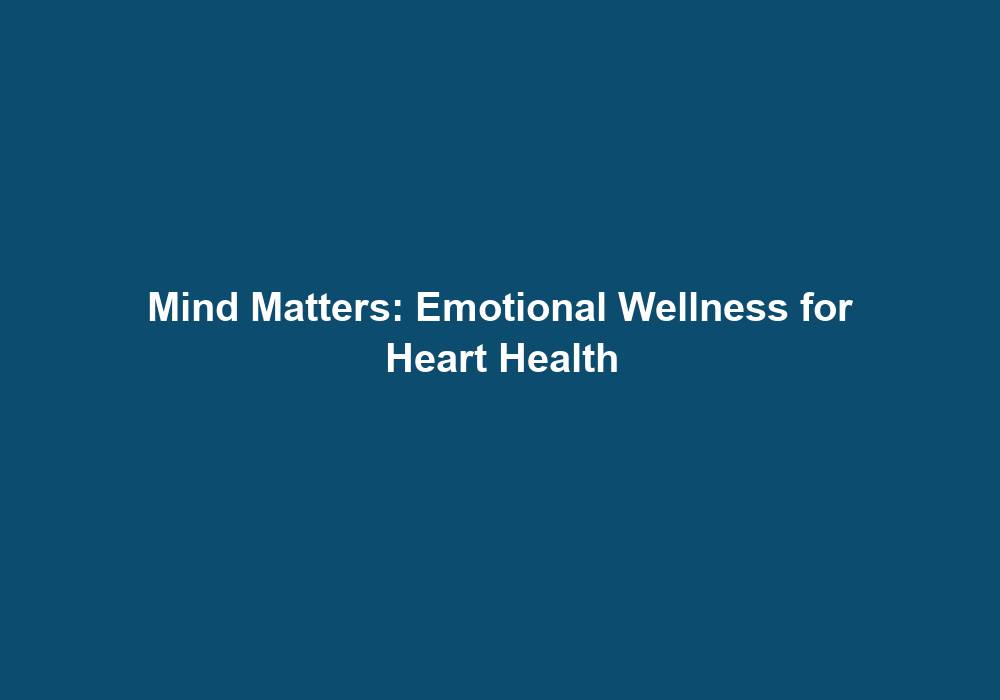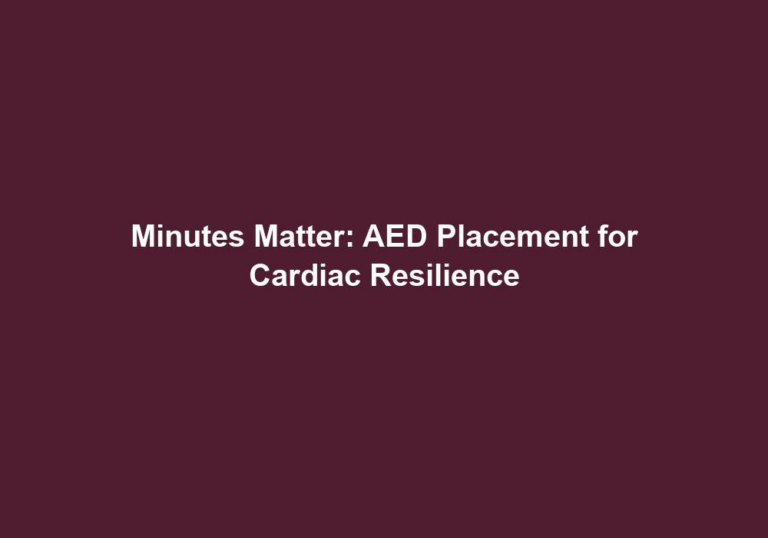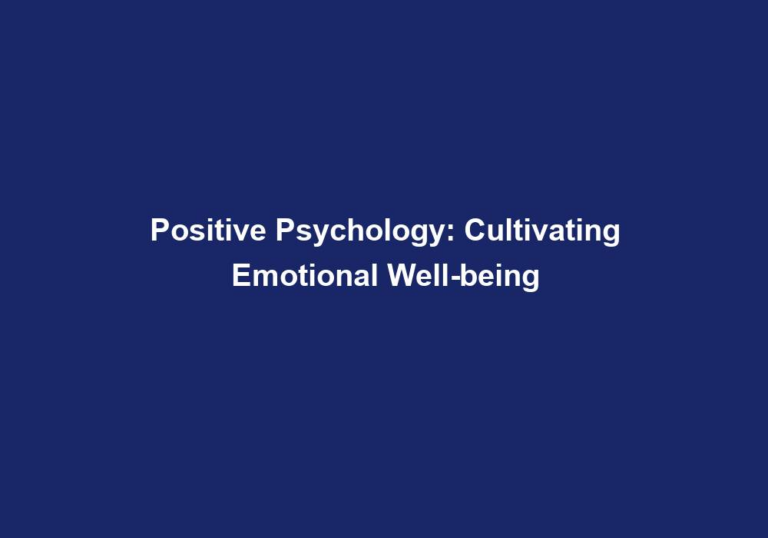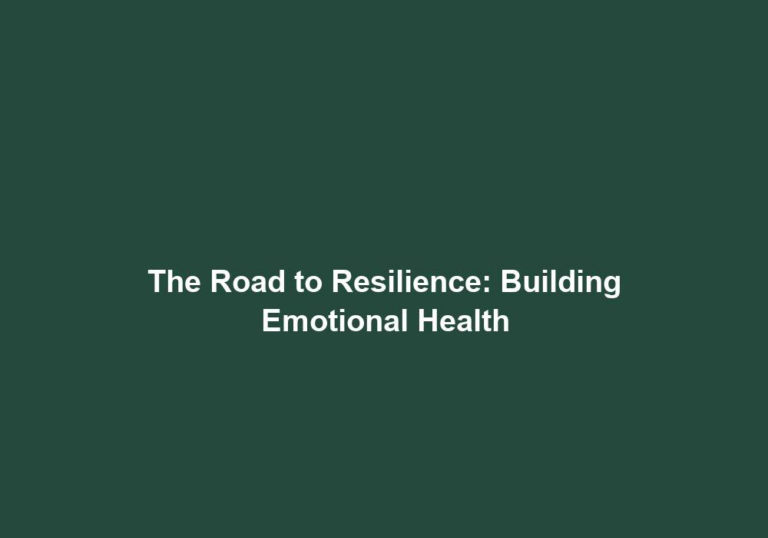Mind Matters: Emotional Wellness for Heart Health
Emotional wellness plays a vital role in maintaining a healthy heart. While physical exercise and a balanced diet are crucial for cardiovascular health, the impact of emotional well-being should not be overlooked. In this article, we will explore the connection between emotional wellness and heart health, and provide practical tips to enhance your emotional well-being to support a healthy heart.
Understanding the Mind-Heart Connection
Research has shown a strong correlation between emotional state and heart health. High levels of stress, anxiety, and depression can contribute to the development of cardiovascular diseases such as hypertension, heart disease, and even heart attacks. On the other hand, positive emotions and a sense of well-being have been associated with a reduced risk of heart-related issues.
It is important to understand that our mental and emotional well-being can directly influence our heart health. Negative emotions like stress, anxiety, and depression can lead to physiological changes in the body, including increased heart rate, elevated blood pressure, and inflammation. These changes, if persistent, can have detrimental effects on the cardiovascular system, increasing the risk of heart diseases.
On the contrary, positive emotions such as happiness, joy, and contentment have been shown to have a protective effect on the heart. When we experience positive emotions, our bodies release hormones like endorphins and oxytocin, which can counteract the negative effects of stress hormones. These positive emotions can promote a healthier cardiovascular system, reducing the risk of heart-related issues.
The Role of Stress
Stress is a significant factor in heart health. When we experience stress, our bodies release stress hormones like cortisol, which can negatively impact the cardiovascular system. Prolonged exposure to stress can lead to high blood pressure, inflammation, and an increased risk of heart disease.
To manage stress effectively, consider the following techniques:
-
Exercise regularly: Engaging in physical activities like walking, jogging, or yoga can help reduce stress levels and improve heart health. Exercise not only helps in releasing endorphins, the feel-good hormones, but also improves blood flow and oxygenation to the heart.
-
Practice relaxation techniques: Deep breathing exercises, meditation, and progressive muscle relaxation techniques can promote a sense of calm and reduce stress levels. These techniques help activate the body’s natural relaxation response, reducing the production of stress hormones and inducing a state of relaxation.
-
Prioritize sleep: Lack of sleep can contribute to stress and affect heart health. Aim for 7-8 hours of quality sleep each night. Good sleep hygiene, such as maintaining a regular sleep schedule, creating a relaxing bedtime routine, and ensuring a comfortable sleep environment, can help improve sleep quality.
-
Engage in enjoyable activities: Hobbies, spending time with loved ones, and engaging in activities that bring joy can help alleviate stress. These activities act as a distraction from stressors and promote positive emotions, reducing the negative impact of stress on the heart.
It is important to find a combination of stress management techniques that work best for you. Experiment with different activities and techniques to identify what helps you relax and manage stress effectively.
Cultivating Positive Relationships
Maintaining healthy relationships is essential for emotional well-being and heart health. Social support can act as a protective factor against stress and may lower the risk of cardiovascular diseases. Here are some ways to foster positive relationships:
-
Spend quality time with loved ones: Make time for family and friends, engaging in activities together, and building strong bonds. Spending quality time with loved ones not only provides emotional support but also helps in reducing stress levels and promoting a sense of belonging.
-
Communicate openly: Effective communication is vital for healthy relationships. Express your feelings, listen attentively, and resolve conflicts constructively. Good communication helps in building trust, understanding, and emotional connection, which are essential for maintaining positive relationships.
-
Join social groups: Participate in community activities, clubs, or volunteer organizations to meet new people and develop meaningful connections. Being part of a social group can provide a sense of belonging, support, and opportunities for social interaction, which contribute to emotional well-being.
-
Seek professional help if needed: If you’re struggling with relationships or emotional well-being, don’t hesitate to seek guidance from a therapist or counselor. Professional help can provide valuable insights, tools, and strategies to improve your emotional well-being and navigate challenges in relationships.
Positive relationships not only provide emotional support but also contribute to a sense of purpose, happiness, and overall well-being. Invest time and effort in nurturing and strengthening your relationships to promote emotional wellness and heart health.
The Power of Positive Thinking
Positive thinking can have profound effects on emotional well-being and heart health. It involves cultivating an optimistic outlook and focusing on the positive aspects of life. Here are some strategies to incorporate positive thinking into your daily routine:
-
Practice gratitude: Start each day by expressing gratitude for the things you appreciate in your life. This simple practice can shift your mindset towards positivity. By focusing on the things you are grateful for, you train your brain to notice and appreciate the positive aspects of life, fostering emotional well-being.
-
Challenge negative thoughts: Identify negative thoughts and replace them with more positive and realistic ones. Reframe challenges as opportunities for growth. Negative thoughts can create stress and anxiety, impacting heart health. By consciously challenging and replacing negative thoughts with positive ones, you can cultivate a more optimistic and resilient mindset.
-
Surround yourself with positivity: Surround yourself with positive people, uplifting books, inspiring quotes, and motivational content to reinforce positive thinking. The environment we expose ourselves to greatly influences our thoughts and emotions. By surrounding yourself with positivity, you create an atmosphere that supports and nurtures your emotional well-being.
-
Engage in self-care: Take care of your physical, mental, and emotional well-being. Prioritize activities that make you feel good and boost your self-esteem. Engaging in self-care activities such as exercise, relaxation techniques, hobbies, and pursuing personal interests can enhance your overall well-being and contribute to a positive mindset.
Adopting Healthy Lifestyle Habits
In addition to emotional well-being, adopting healthy lifestyle habits can significantly impact heart health. Consider incorporating the following practices into your daily routine:
-
Eat a heart-healthy diet: Consume a balanced diet rich in fruits, vegetables, whole grains, lean proteins, and healthy fats. These foods provide essential nutrients, antioxidants, and fiber that support heart health. Limit processed foods, sugar, and excessive salt intake, as they can increase the risk of heart diseases.
-
Stay physically active: Regular exercise strengthens the heart and promotes overall well-being. Aim for at least 150 minutes of moderate-intensity exercise each week. Incorporate activities that you enjoy and that align with your fitness level. Exercise not only improves heart health but also reduces stress, boosts mood, and enhances overall quality of life.
-
Avoid smoking and excessive alcohol consumption: Smoking damages blood vessels and increases the risk of heart disease. Quitting smoking or avoiding it altogether is one of the best things you can do for your heart health. Additionally, limit alcohol intake to moderate levels or avoid it altogether, as excessive alcohol consumption can have detrimental effects on the heart.
-
Manage weight: Maintaining a healthy weight reduces the risk of heart-related issues. Combine a nutritious diet with regular exercise to achieve and maintain a healthy weight. Excess weight puts strain on the heart and increases the risk of conditions such as high blood pressure, diabetes, and heart disease.
Conclusion
Emotional wellness is a vital aspect of heart health. By managing stress, cultivating positive relationships, adopting positive thinking patterns, and embracing healthy lifestyle habits, you can promote emotional well-being and support a healthy heart. Remember, small changes in your daily routine can make a significant difference in your overall well-being, so start taking steps towards a healthier mind and heart today.
This article is provided in markdown format as requested.







